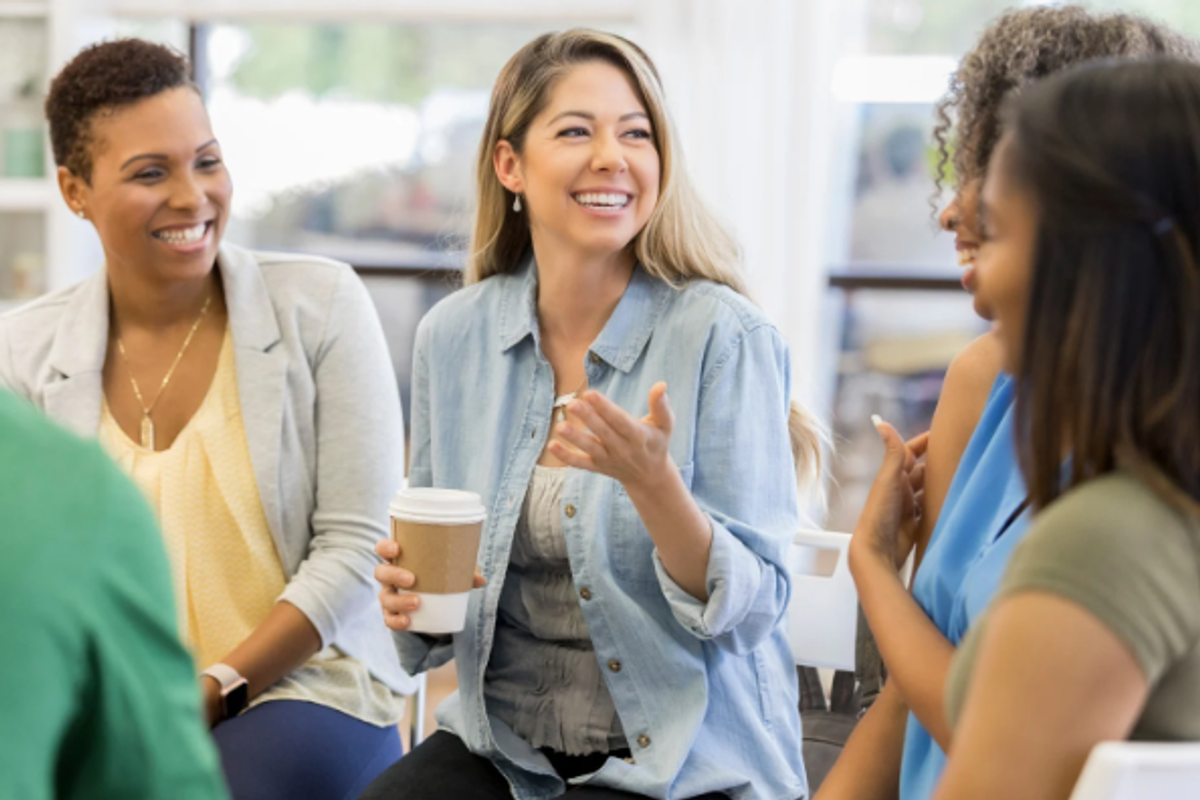
When my wife returned to work after parental leave, I took my first trip to the grocery with two kids.
Little did I know I would return home feeling like a hero.
On a Monday morning, I pushed the green cart with flame decals through the second set of sliding doors and toward the deli. My 3-year-old son was strapped in the seat and my 3-month-old son was wrapped against my chest.
As a stay-a-home father strolling through the grocery, I felt conflicting emotions — love for caring for my sons and frustration with being an unemployed 37-year-old man.
At the deli, I exchanged pleasantries with a young woman behind the counter and ordered a pound of sliced turkey breast. I was immediately surrounded by a group of female employees. They leaned close to admire my infant son as he raised his bald head from the green cloth wrap.
“I never could get mine to like the wrap," one said.
“I bet y'all have so much fun together," another said.
“You are the best dad ever," another said.
I swelled with pride. Maybe they're right! Maybe I am the best dad ever.
I soaked in the praise before tossing my sliced turkey into the cart and heading toward the produce.
As I strolled, more comments came from fellow shoppers, and I absorbed them, giving little thought to the reason why I merited heightened attention.
“Nice baby wearing," a young woman said.
“That is one way to keep 'em warm," an elderly woman said.
“Man, you are taking this dad thing to the next level," a bag boy at checkout said.
The series of verbal high-fives inflated my ego and, after receiving the receipt from the cashier, I smiled and pushed our flaming green cart through the sliding doors like a rock star walking offstage.
I had no clue I was benefiting from male privilege.
I enjoy the attention I receive as a stay-at-home dad; it's nice to have impressed eyes turned on me.
My rationale for basking in the compliments is that I spend most of my time wading through dirty diapers, spit-up, and spilled Cheerios. I deserve some praise, right?
I thought so, until one Sunday morning I sipped coffee and read an article (a rare kids-free moment in the kitchen) about faux male feminists. The article included comments from Tal Peretz, a sociology professor at Auburn University, who described a concept called “the pedestal effect."
As I read, my male privilege became uncomfortably visible. The pedestal effect refers to when men receive undeserved praise, attention, and rewards for performing work traditionally done by women, like carrying a baby in a wrap.
At the grocery store, I willingly stepped on the pedestal and used my privilege to gain attention for basic child care.
And as I reflected on Peretz's words, other pedestal moments flashed in my mind. This realization was not something I could ignore.
If you believe in gender equality, it is not hard to understand why it is problematic to place one gender on a pedestal for doing the bare minimum, while another bears the bulk of the child care. Not only is it unfair, but it's also not in the best interests of families and can place stress on them when parenting roles are unbalanced.
For men who value gender equality and healthy families, assisting in lowering the pedestal is imperative.
After reading Peretz's comments, I wrestled with how to respond and, hopefully, how to help other dads become more aware of this privilege. I reached out to him to discuss the pedestal effect, and he offered practical ways to counter male privilege.
He reminded me of the complexity of privilege and how it operates on different levels — individual, interpersonal, institutional and structural.
We cannot dismantle institutions and structures by ourselves, but we can start with naming our privilege and giving credit to women wherever it is due.
Naming our privilege through raising awareness is a good place to begin, because men have been socialized to interact with women in particular ways, and it can be difficult for us to see how we are perpetuating gender inequality.
Peretz recommends using resources such as privilege checklists to identify your advantages. These resources can help us move unconscious thoughts and behaviors into the light of awareness. Ideally, this work will lead to interpersonal change.
Men can make the effort to closely listen to women to understand how they perceive male privilege. And, most importantly, we need to believe women.
Maybe you remain skeptical that a pedestal effect exists for fathers. Ask a mother whether she believes fathers benefit from undeserved praise. Her answer might surprise you. Men get attention and praise for doing work women do every day.
Raising awareness and listening are important steps, but I also wanted to know how to best respond when given undeserved attention.
Peretz recommends reacting “with humility and a sense of humor," while bringing attention and awareness back to the work women have been doing for a long time.
For example, at the deli, I could have redirected the conversation. I could've used one of these playful responses suggested by Peretz: “Yeah, I'm really glad that my wife did all the heavy lifting of pregnancy and childbirth so I'd get to enjoy this little monster," or “I really appreciate that, but it's nothing my mom didn't have to do for me!"
I want to do a better job of stepping off the pedestal and challenging sexist beliefs about parenting.
I want to better align myself with the women who have been doing this work for generations and assist them in creating more balanced roles within families. And I want to share the most important lesson I've learned while reflecting on this issue, which is that not only should I do this work because it is the right thing to do, but also because I need it.
Men need to be liberated from the rigid forms of masculinity that create a pedestal in the first place. Only when we step off them can we hope to be free.
This story originally appeared in the On Parenting section of The Washington Post and is reprinted here with permission.
- Sweden's parental leave laws have revolutionized the lives of moms. - Upworthy ›
- 'SAHMs Listen up!': Texas UPS driver has blunt message about entitlement and stay-at-home moms - Upworthy ›
- 80-year-old has special, tearjerking message for under-appreciated stay-at-home moms - Upworthy ›
- PhD parenting coach says praise your child 100 times a day - Upworthy ›



 Student smiling in a classroom, working on a laptop.
Student smiling in a classroom, working on a laptop. Students focused and ready to learn in the classroom.
Students focused and ready to learn in the classroom.

 Fish find shelter for spawning in the nooks and crannies of wood.
Fish find shelter for spawning in the nooks and crannies of wood.  Many of these streams are now unreachable by road, which is why helicopters are used.
Many of these streams are now unreachable by road, which is why helicopters are used. Tribal leaders gathered by the Little Naches River for a ceremony and prayer.
Tribal leaders gathered by the Little Naches River for a ceremony and prayer.
 A black and white photo by Anna Mullins.Photo Credit: Anna Mullins Via Threads
A black and white photo by Anna Mullins.Photo Credit: Anna Mullins Via Threads A Gen X woman becomes mayor of a town.Photo Credit: Threads, Hollie Rogin
A Gen X woman becomes mayor of a town.Photo Credit: Threads, Hollie Rogin Sandra Ebejer's art hangs in a gallery.Photo Credit: Threads, Sandra Ebejer
Sandra Ebejer's art hangs in a gallery.Photo Credit: Threads, Sandra Ebejer
 A woman sharing her ideas with friends.via
A woman sharing her ideas with friends.via  A man and woman enjoying a pitcher of beer.via
A man and woman enjoying a pitcher of beer.via